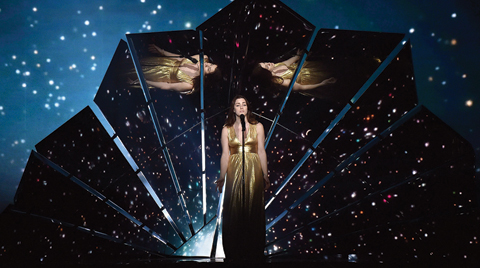 British singer representing United Kingdom with the song ‘Never give up on you’ Lucie Jones performs on stage.
British singer representing United Kingdom with the song ‘Never give up on you’ Lucie Jones performs on stage.Ukraine gears up to host the Eurovision Song Contest final in Kiev yesterday with Italy's dancing gorilla entry and Portugal's traditional balladeer tipped to win while Russia sits out after a controversial ban on its singer. The annual celebration of infuriatingly catchy europop, ludicrous costumes and nonsensical lyrics watched by some 200 million TV viewers is being hosted by ex-Soviet Ukraine for the second time. Its hosting of the 2005 contest symbolized the country's quest to open up to Europe after the 2004 pro-Western Orange Revolution.
This time, Kiev's main Kreshchatyk street has been transformed into a Eurovision fan zone that includes a large stage and chill-out zones with beanbags. Yet heightened security has seen officers patrolling with semi-automatic machine guns and camouflaged police vans on the streets. For 20-year-old student Irina, snapping a selfie in front of a Eurovision sign, the event is about more than just music. "We're striving towards Europe," she said. "It's not just a song contest but also an opportunity to show ourselves off."
Visitors from other countries including Italy, Israel and Germany also converged on the central fan zone. "It looks very well organized with lots of activities," said Jonathan Pezzali, a 50-year-old manager from near Milan. The concert venue, however, is an uninspiring exhibition centre across the city's Dnipro River. Ukraine is hosting Eurovision just two years after pulling out in 2015 over the armed conflict with pro-Russian separatists in the country's industrial east. As the shelling goes on there, the impact of the hostilities echoes in the contest with neighbor Russia conspicuously absent.
Kiev barred Russia's wheelchair-user singer Yuliya Samoilova because she had illegally entered Crimea to perform there after Moscow's disputed 2014 annexation of the peninsula from Ukraine. Both countries ignored pleas from organizers, the European Broadcasting Union, and Russia has refused to air the contest, forcing fans to watch online. "The absence of Russia has had a really negative effect on the contest," said Artur Gasparyan, showbiz correspondent for Russia's Moskovsky Komsomolets daily, one of the few Russian journalists in Kiev.
"Neither Russia nor Ukraine benefitted from this, nor the millions of Eurovision fans who live in Russia," he said. Russia has vowed that Samoilova will compete in 2018, putting Ukraine in a tricky dilemma over whether to participate alongside her. After the Kiev event opened, it emerged that the Bulgarian contestant, 17-year-old Kristian Kostov, had also performed in annexed Crimea. The singer, who has appeared on a Russian television talent show, was allowed to stay in the contest because he was only 14 at the time. He will appear in the final.
Naked apes
The latest edition of the contest that began in 1956 with just seven countries promises the usual feast of wacky stage acts and cheesy beats. Azerbaijan's act features a man wearing a horse's head on a stepladder while Romania presents an unlikely combination of yodeling and rap with two giant cannons on stage for no apparent reason. Britain may be experiencing a post-Brexit vote chill in Europe, but is pulling out all the stops with its big ballad performed by Lucie Jones.
Prime Minister Theresa May has vowed not to exit the contest, despite the nation winning derisory points in recent years. While English is usually essential for a Eurovision win, this year's favorites are songs in Italian and Portuguese-two nations that insist on using the local language. Admittedly Italian Francesco Gabbani's cerebral references to Hamlet, the state of Western civilization and Desmond Morris's anthropology book "The Naked Ape" may be lost on viewers focusing on the giant gorilla-costumed dancer bogeying by his side.
"The gorilla isn't just for fun," he told journalists ahead of the final. "We are all like naked apes." Portugal has never won Eurovision but it has scored a surprise hit with its fado-tinged, melancholic song "Amar Pelos Dois" that now rivals Italy to win. The Portuguese contestant, 27-year-old Salvador Sobral, has a life-threatening heart condition that has prevented him from taking part in rehearsals. Italy has won twice in the 1950s and 1960s but shunned the contest for more than a decade from 1997 before rejoining it in 2011.
Ukraine won last year with the song "1944" performed by Jamala, which referred to the Stalin-era deportation of her Tatar ethnic group from Crimea. Crimean Tatars, who are Muslims, largely opposed the peninsula's annexation and have been persecuted under the new Russian authorities. Ukraine is using this year's event to take tentative steps toward breaking away from the climate of homophobia prevalent in the ex-Soviet Union.
The authorities are handing out a map of gay-friendly venues for fans of the contest that enjoys a massive gay following. In a cheeky move, they also started repainting in rainbow stripes a huge Soviet-era arch in central Kiev that commemorates Ukraine and Russia's friendship-only to be physically threatened by ultranationalist protesters. As of Friday, the arch remained unfinished with expanses of grey among the bright colors.--AFP










